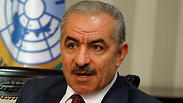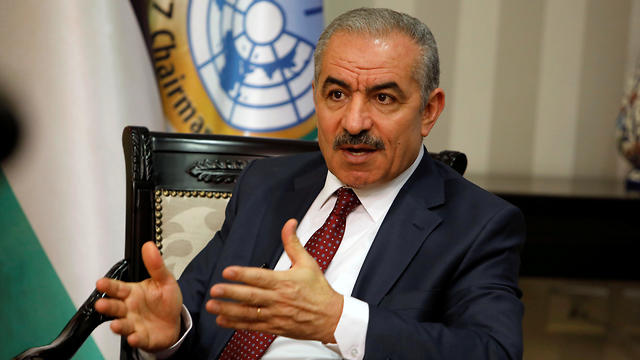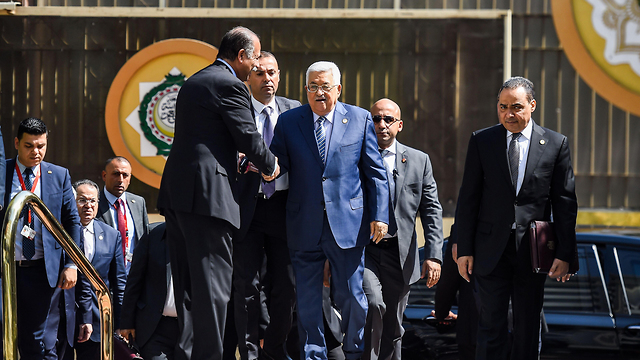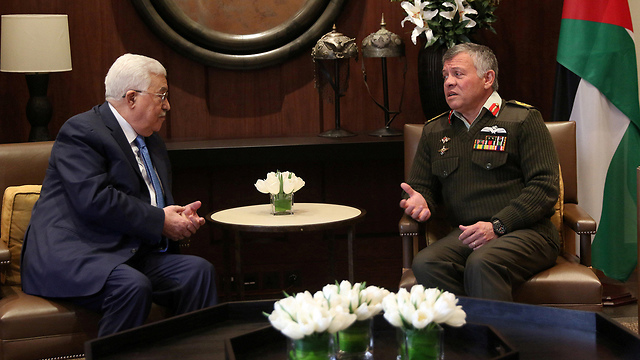

Palestinians seeking to disengage economically from Israel
Aiming to end the reliance on Israel and counter the U.S. plan for the region, the Palestinian prime minister is looking for trading partners and investment in Amman and Baghdad; 'The move is part of the Palestinian development strategy for 2017-2020,' says PA official Abd al-Rahman
Palestinian leaders are spearheading a new effort to reduce their economic dependence on Israel by approaching Arab states for economic cooperation and agreements in a move meant to help counter the Trump Administration’s so-called deal of the century peace project.
Over the past two weeks, a delegation headed by Prime Minister Mohammad Shtayyeh visited Iraq and Jordan, where senior Palestinian officials discussed proposals for new economic understandings and emphasized the importance of “maintaining the priority of the Palestinian cause among Arab states in order to unite efforts to end the Israeli occupation.”
Azmy Abd al-Rahman, spokesperson for the Palestinian Authority’s Economy Ministry, told The Media Line that reducing dependence on Israel was the top priority of the ministry and the government.
“The move is part of the Palestinian development strategy for 2017-2020,” Abd al-Rahman said. “We are currently studying which Israeli products the Palestinian market can dispense with.”
He said that currently, 85 percent of Palestinian exports go to Israel, while 60% of Palestinian imports come from Israel.
“We follow a plan of gradual withdrawal (from trading with Israel) by steps,” he said.
This week, Shtayyeh met with the Iraqi president and prime minister, and reviewed the latest political developments. He was accompanied by Foreign Minister Riyad al-Maliki, Finance Minister Shukri Bishara and Economy Minister Khalid al-Asaily.
Also in the delegation were Agriculture Minister Riyad al-Attari, Secretary-General of the Council of Ministers Amjad Ghanem and Majid Faraj, the head of Palestinian Intelligence.
“We want to implement memorandums of understanding and agreements between the two countries and put them into effect, especially in the fields of agriculture, industry and trade, in line with the government’s strategy and decision to gradually disengage from the occupation,” Shtayyeh stated in a press release following his visit.
This would be accomplished “through opening up to international markets, especially in Arab countries, and strengthening the Palestinian national product, as well as promoting it internationally,” he continued.
The Iraqi government stressed its support for the Palestinian people in order to ensure a just and comprehensive solution to end the conflict, and stressed the keenness of Bagdad to ensure that Palestinians who lived in Iraq receive their full, legitimate rights and entitlements.
Hisham al-Hashimi, an Iraqi political analyst and historian, explains that the delegation’s visit revolved around promoting investment from Palestinian business people living in Iraq.
“Bagdad can’t support the Palestinians directly, as most of the political extremist groups in the country refuse to do that through the Israeli-controlled borders,” he said.
Hashimi confirmed that Iraq would not participate in or support the American peace project, although he added: “Bagdad can’t really stand against the ‘deal of the century’ currently or affect it negatively or positively.”
He clarified that Bagdad’s position on the Palestinian case was “clear and solid,” but that the country would not get directly involved.
Shtayyeh met with his Jordanian counterpart in Amman on July 7 and briefed him on the Palestinian political and financial situation, saying it was a result of Israeli measures.
Memorandums of understanding were signed between the Palestinian Economy Ministry and the Jordanian Ministry of Industry, Trade and Supply, including for the mutual recognition of conformity certificates and quality levels, as well as in the field of industrial property.
Another, between the Food and Drug Organization of Jordan and the Palestinian Standards Institution, was signed by Palestinian Health Minister Mei Kila and her Jordanian counterpart, Saad Jaber.
Oraib Rintawi, a Jordanian political analyst, stressed to The Media Line that there was a clear Palestinian approach to disengaging the economy from “Israeli occupation and its highly strict measures,” calling it a “great and much-needed approach,” albeit a bit late.
Rintawi added that the Palestinian effort was welcomed by Arab states such as Jordan, which wants to partner with the Palestinians and gain a share of their market.
“The Palestinian visits to Jordan and Iraq aim to open new windows for business cooperation that would help (the Palestinians) achieve their ultimate goal,” he stated.
However, he pointed out the issue of Israeli obstacles he said prevented the expansion of economic cooperation between Palestine and any other country.
The main question remains, Rintawi said, whether Palestinian and Jordanian diplomacy would succeed in creating public support and recruiting the international community to pressure Israel, so they can move forward with their plans.
“Otherwise,” he concluded, “all of the signed agreements and understandings are a waste of time.”
Article written by Dima Abumaria. Reprinted with permission from The Media Line



















